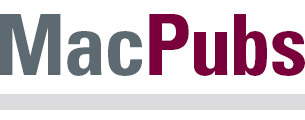McMaster University Library Impact Report 2023-2024
2023-2024 Impact Report
McMaster University Library
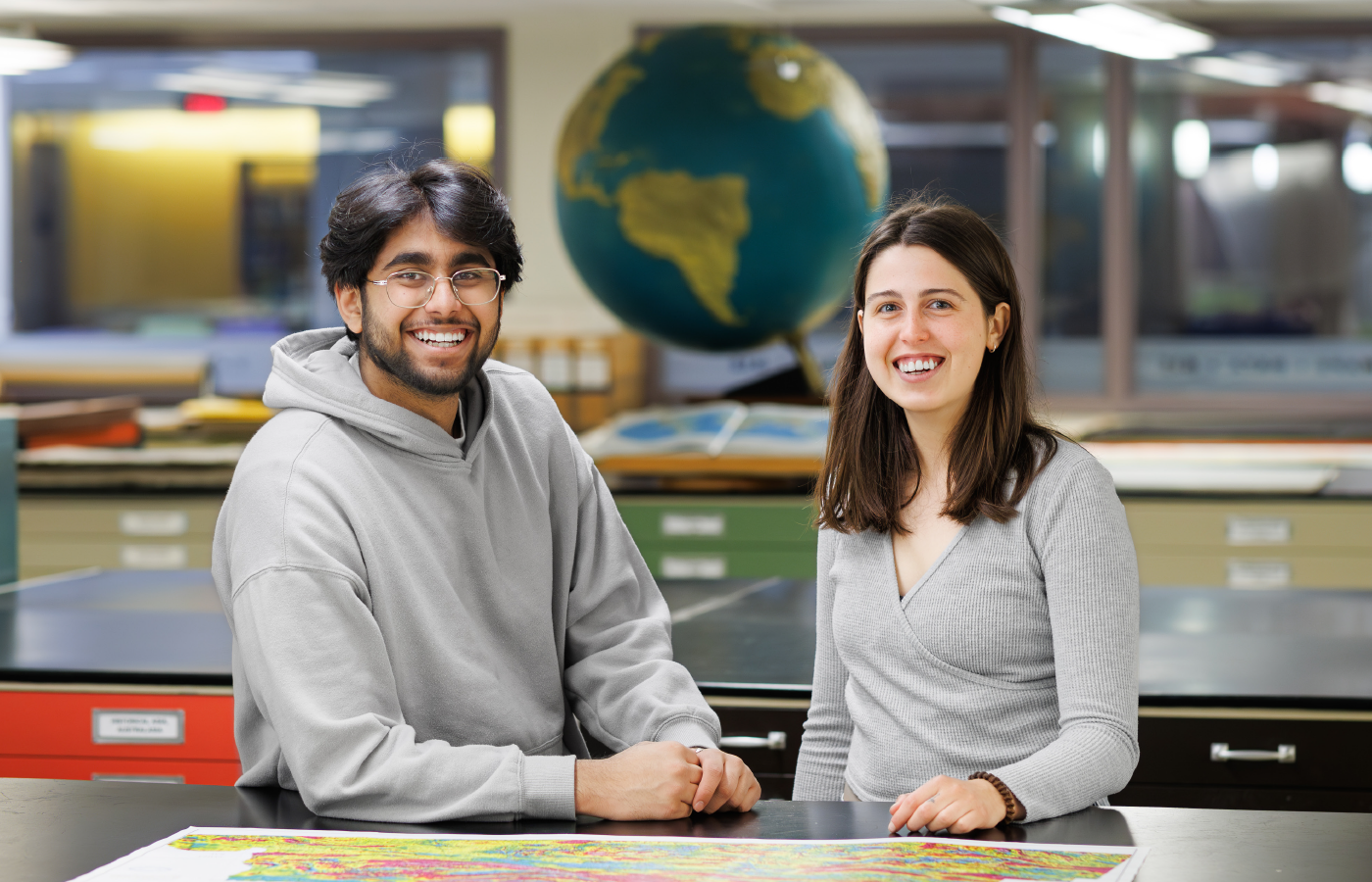
Message from the Associate Vice-President and University Librarian
I am excited to share our 2023-2024 Impact Report from McMaster University Library.
If there’s one theme that could be applied to our work this year, it would be “making space”.
We’re making space for more voices in our libraries. In collaboration with the Health Sciences Library, we’ve hired our first specialist in diversity, equity, inclusion, and accessibility. You can meet Crystal Mark in this report. You’ll also find several other stories on meaningful related work led by our librarians and staff.
We are also working on making more physical space in our libraries.
We eagerly anticipate the reopening of Innis Library in fall 2025 at the new McLean Centre for Collaborative Discovery at the DeGroote School of Business. We’ve included a gallery of construction photos for you to see the progress.
We also undertook a feasibility study to explore the possibility of a significant renovation to Mills Memorial Library and the McMaster Museum of Art. The original building dates back to 1949, with three major additions and one major wing renovation since. Of course, the biggest obstacle is cost and we would need to have all funding secured early in the project.
Meanwhile, we continue to evolve with the times, with a virtual reality room as well as an already popular group podcast studio now available at Lyons New Media Centre.

Of course, we continue to find innovative ways to support research, teaching, and learning at our institution. As you read through the report, you’ll learn more about our expanded grant program to fund open educational resources, meet our first continuing bibliometrics and research impact librarian, and see photos of exciting additions to our archives and research collections.
Please find a donation link at the bottom of this report and consider giving if you are able. Every dollar helps support the mission of McMaster University Library.
I hope you enjoy our latest update.
Sincerely,
Vivian Lewis, Associate Vice-President and University Librarian
McMaster library spaces
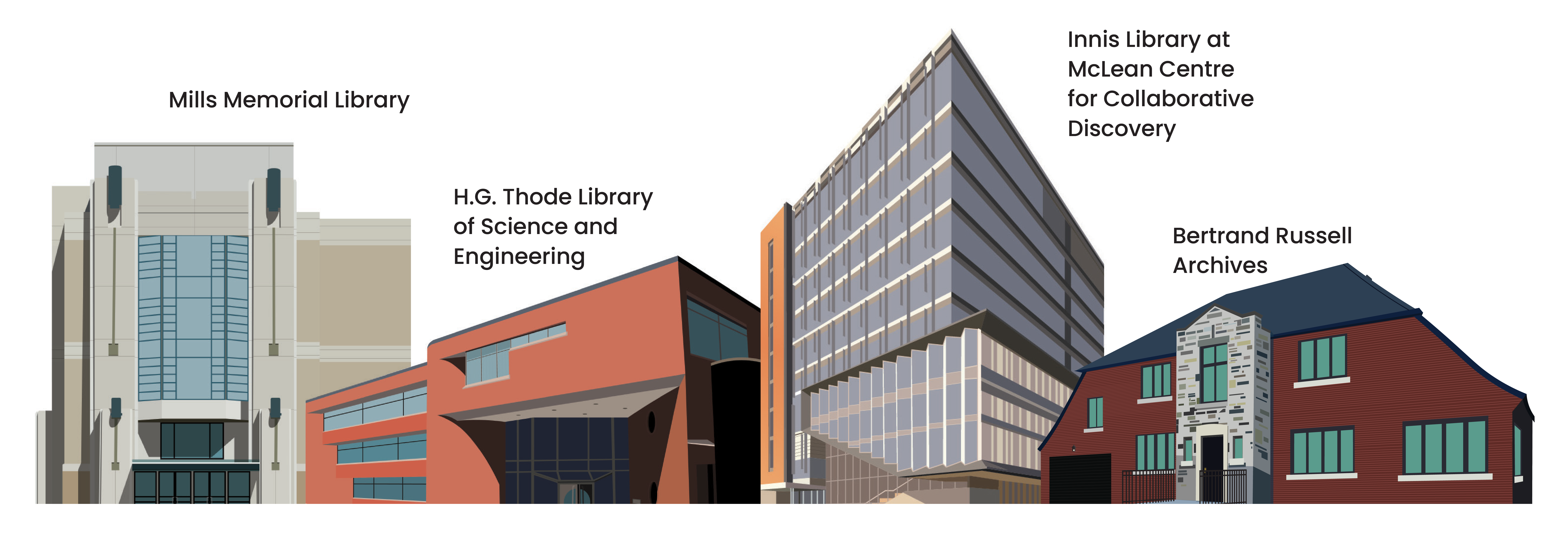
Information Box Group
Mills Memorial Library
Mills Memorial Library is home to the humanities and social sciences collections and offers a range of special services and resources. Among the numerous spaces within Mills are the William Ready Division of Archives and Research Collections, Lewis and Ruth Sherman Centre for Digital Scholarship, Lloyd Reeds Map Collection, and Lyons New Media Centre.
H.G. Thode Library of Science and Engineering
H.G. Thode Library is home to the science and engineering collections and offers services, study spaces, and learning resources. Thode Makerspace, an interdisciplinary and hands-on experiential learning space on the lower level of Thode library, proudly serves the McMaster community.
Innis Library
Innis Library, home to the business collections and a range of research and instructional services, is closed during the construction of its new home, the McLean Centre for Collaborative Discovery at the DeGroote School of Business. The new Innis Library, to be located on the third floor of the McLean Centre, is tentatively planned to open in fall 2025.
Bertrand Russell Archives
The Bertrand Russell Archives is home to the archive and personal library of famed British philosopher, peace activist, and Nobel Prize laureate, Bertrand Russell (1872-1970) and is one of the most heavily used research collections at McMaster library. The archives are open to the public at 88 Forsyth Avenue, located across the street from McMaster University.
Vision & Mission
Vision
McMaster University Library aspires to be a catalyst of intellectual activity for the University and its community.
Mission
McMaster University Library supports the University’s research and teaching mission by advancing knowledge and discovery, inspiring creativity, and building community. We deliver innovative services, welcoming spaces, and exemplary collections to accelerate research, enhance learning, and improve the user experience.
Lyons New Media Centre opens virtual reality room and podcast studio
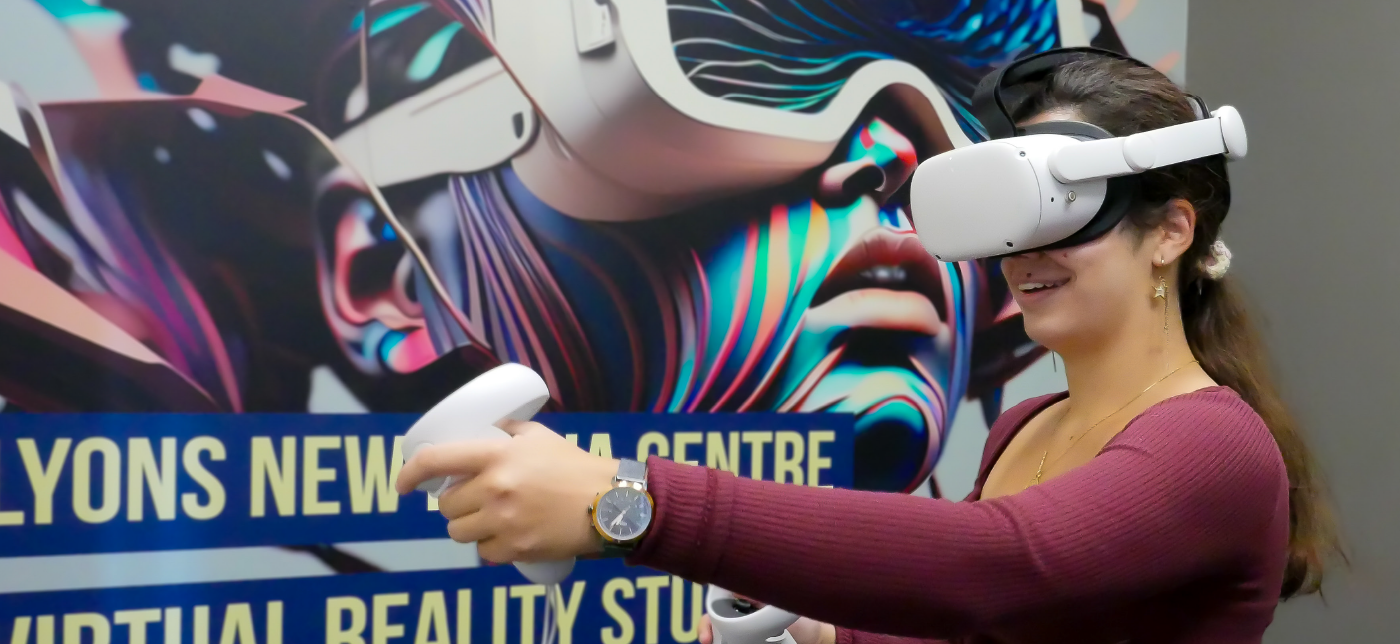
Lyons New Media Centre has expanded its offerings with two new spaces for the McMaster community to learn and create.
The group podcast studio and a virtual reality room opened in September 2023 to serve McMaster students, faculty, and staff. The fresh additions complement the centre’s existing lineup of media services and spaces.
“Our team is constantly evaluating the evolving trends in media and technology, and assessing how we can incorporate those trends into our services,” said Rhonda Moore, manager of Lyons. “We’re thrilled to offer our campus community two new spaces to explore their creative side and discover unconventional ways of learning through modern technology.”
A hub of creativity and technology, Lyons New Media Centre is located on the fourth floor of Mills Memorial Library.
The new virtual reality room offers two Meta Quest headsets and a television for casting live experiences to spectators. Each headset is equipped with a range of educational apps, including Blueplanet VR, which enables users to explore some of the world’s most remarkable locations.
Next door to the virtual reality room is the audio studio, which now includes a large podcast room for group recording sessions.
The private space features a table with chairs for up to four people, four sets of microphones and headphones, a computer equipped with audio editing software, and sound-dampening walls. Users can also make use of the webcam and portable greenscreen for video recording.
McMaster President David Farrar is among the many users—and fans—of the already popular group podcast studio.
“It’s a pleasure to film my new video podcast series in the Lyons New Media Centre,” said Farrar. “This new studio, along with the virtual reality room, show how the library is at the cutting edge of digital technologies that support world-class teaching and learning at McMaster.”
Mapping a diverse collection at McMaster library
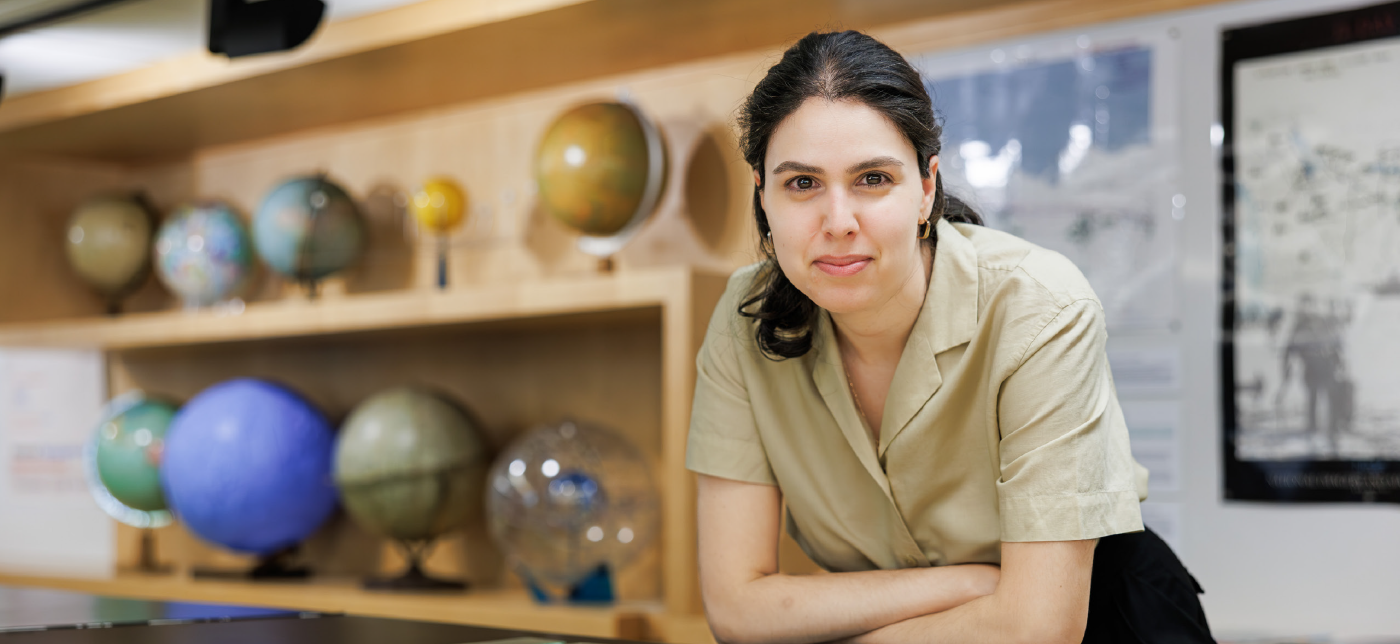
Saman Goudarzi is blazing her own trail as the cartographic resources librarian at McMaster University.
Goudarzi joined McMaster in 2022, drawn by the opportunity to work as one of the few academic map librarians in Canada.
“It was daunting arriving at a new library during the pandemic, but it was incredibly exciting at the same time,” she said. “Two years in, I finally feel like I am getting to really know the collection and how I want to shape it moving forward.”
McMaster University Library is considered one of the main players in the field of military maps. Most recently, its maps were featured in the Second World War drama, Masters of the Air, which debuted on Apple TV+.
Goudarzi is continuing to grow the western cartography collection while also working to enhance diversity.
Hamilton-focused cartography is one area of focus, with the acquisition of traditional and untraditional maps. As an example, Goudarzi cites the recently acquired zine The Hamilton Sub Register created by an artist who mapped past and present sandwich shops in the city.
“It provides us with a unique snapshot of Hamilton at a particular point in time,” she said.
Another new focus is documenting what she calls “invisible voices” that were involved in early cartography.
She notes that French cartographers often collaborated with Indigenous peoples when creating maps of the ‘New World’. Goudarzi has partnered with Ruth-Ellen St. Onge, McMaster’s distinctive collections cataloguing librarian, to ensure rare maps with Indigenous contributions are appropriately described in the library’s digital catalogue.
“While these maps are products of colonialism, by adopting a more critical lens, we can re-examine, and reinterpret them, challenging dominant perspectives and uncovering hidden narratives,” she said.
“These maps can therefore play a crucial role in decolonization work, as well.”
Among the other current initiatives are documenting works printed by women-owned presses, adding maps from Global South authors, and working with small presses to add more local voices to the collections.
Supporting made-at-McMaster teaching and learning resources
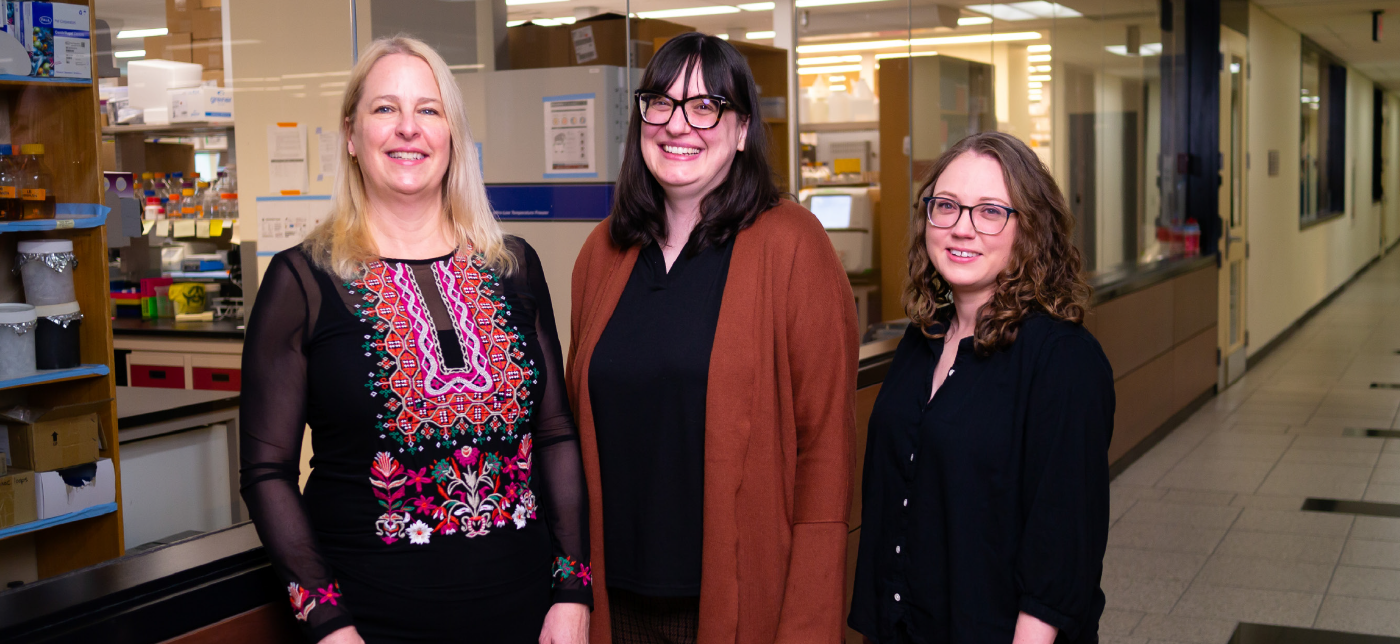
A grant program led by McMaster University Library and MacPherson Institute, funded by the Office of the Provost, is supporting the creation and adaptation of new teaching and learning materials by McMaster instructors.
The Open Educational Resources (OER) grant program was introduced as a three-year pilot in 2020 with $30,000 available each year. The program expanded in 2023, with double the funding available for each of the next three years.
“The OER grants provide support for McMaster instructors as they integrate these materials into their courses,” said Katie Harding, teaching and learning librarian, OER and STEM at McMaster University Library. “The different grant types ensure that there’s flexibility for instructors to use OER in the ways that work for them.”
The McMaster grant program was created to increase instructors’ awareness of OER and encourage exploration of new teaching approaches. The program offers instructors options to develop customized course materials that support learning outcomes, while lowering costs for students who no longer need to purchase these materials. To date, OER created through the grant program have saved McMaster students an estimated $700,000.
The program is supported by the Office of the Provost, McMaster University Library, the MacPherson Institute, and McMaster Students Union.
Grant recipients to date come from all five faculties and the DeGroote School of Business.
Felicia Vulcu and Caitlin Mullarkey, associate professors in the Department of Biochemistry and Biomedical Sciences, received a 2023-2024 grant to create the Biochemistry and Biomedical Sciences Thesis Course Guidebook. It will be launched using the Pressbooks platform and will be openly available globally for adaptation and adoption.
“The McMaster OER grant program is vital to supporting the creation, adaptation, and adoption of OER content,” said Vulcu. “This type of content disrupts traditional teaching barriers and allows for open access content created by the McMaster community. The ability to customize truly enhances the learning experience and comes closer to providing a more personalized educational experience for both the content creator and the end user.”
Bringing the “big bus full of books” to campus

The bookmobile is a library branch on wheels, and it is rolling up to campus every week.
A mainstay of Hamilton Public Library, the bookmobile started making weekly stops on the McMaster University campus during the 2023-2024 academic year.
Since the first visit in September 2023, it has received hundreds of visitors.
“McMaster University Library is excited to partner with Hamilton Public Library to bring the bookmobile to campus,” said Lynne Serviss, associate university librarian, User Services and Community Engagement.
“We have received so much positive feedback from McMaster students, in particular, since we launched this initiative.”
McMaster library staff identified a gap between the more academic collection that the library has on campus and some of the leisure-focused needs of the students. This included leisure reading, popular fiction, health and wellness materials, and other resources like cookbooks.
McMaster library regularly partners with Hamilton Public Library on initiatives and events to foster community engagement, so it seemed only logical to bring the beloved bookmobile to campus.
Cindy Poggiaroni, director, Collections and Program Development at Hamilton Public Library, says the bookmobile stop at campus helps both organizations serve different populations in the community.
“We’re thrilled the McMaster community is embracing this service with many touring the bus, signing up for library cards, and picking up their holds,” she said.
The weekly bookmobile visits have returned for the 2024-2025 academic year. Serviss says she hopes the weekly visits make accessing good reads easier for the McMaster community.
“It’s not always easy for people to make their way to a local library branch, so I love the idea of bringing the library to them,” said Serviss. “I hope our McMaster community finds this resource helpful. For some, it will also bring back a bit of childhood nostalgia to get on that big bus full of books.”
Falling “Innis” Love

The past year has seen significant progress made on the construction of the new Innis Library at the McLean Centre for Collaborative Discovery at the Michael G. DeGroote School of Business. Employees are excitedly preparing to open the business library and welcome the McMaster community in fall 2025.
If it’s broke, fix it at Thode Makerspace Repair Café
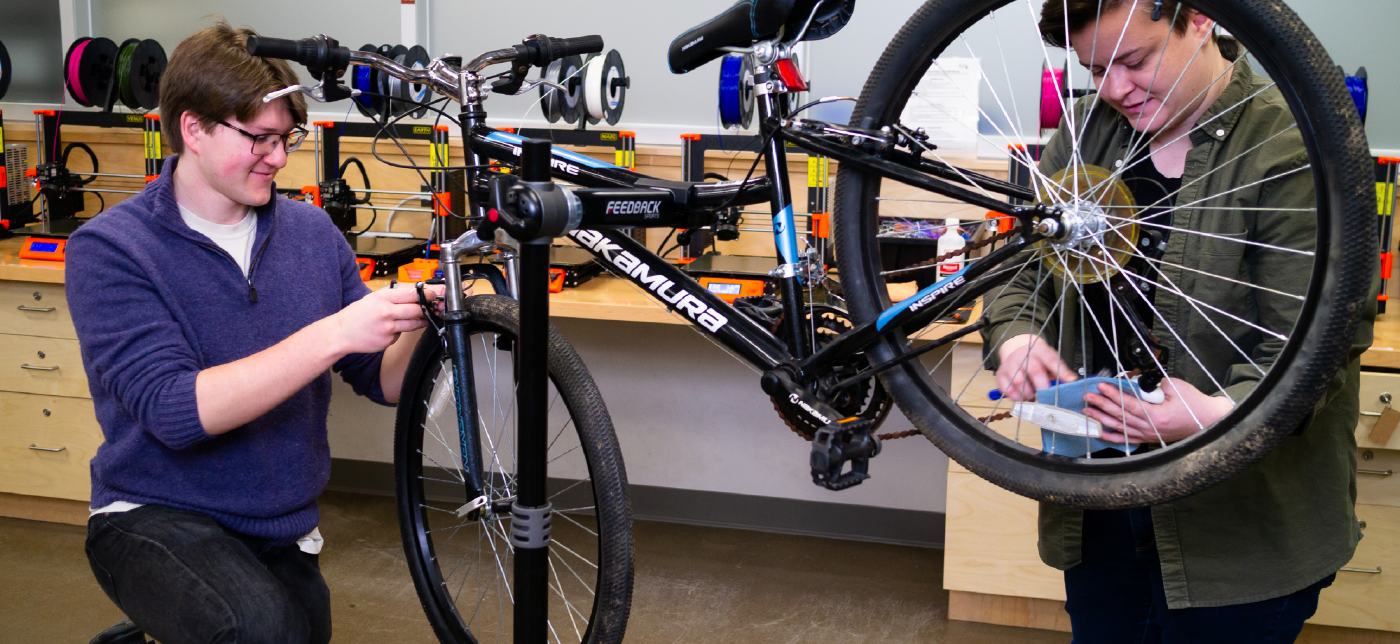
It’s Wednesday afternoon and Thode Makerspace is a hub of activity.
A student is busy at a sewing machine mending a rip in a backpack, a community volunteer is working to fix a necklace clasp, and a team of library staff and students is working to repair a toaster that won’t pop.
Welcome to Thode Makerspace Repair Café, a monthly event hosted by the library to divert waste from the landfill and bring the community together to share learning and skills.
“I think the repair café can have an impact on the environment through the ability to bring broken, old, or discarded items back to life,” said Vladimir (Vlad) Brundula-Ilija, a third-year civil engineering and society student. “We are not only able to guide participants through the repair process, allowing items to receive a second life, but we can also encourage people to think further before discarding items.”
The repair café concept is a global initiative that seeks to resist the throw-away economy by empowering people to repair their broken items instead of getting rid of them. McMaster University Library hosted its first repair café in 2020. Today, the event is hosted monthly throughout the academic year.
Brittany Sostar, Makerspace coordinator, says it has been powerful seeing the growth in the skill sets of everyone involved in the repair café.
“We have a participant come by regularly with clothing that needs repaired,” Sostar said. “During his first visit, we sat with him and showed him how to patch his pants. By the second and third visits, he was sewing patches on his own clothing. It’s a good feeling to take on something you might have otherwise thought was not possible.”
Volunteers from the McMaster community and beyond are always needed to support the Thode Makerspace Repair Café. For more information, email mkrspace@mcmaster.ca.
Making space for more voices in library collections
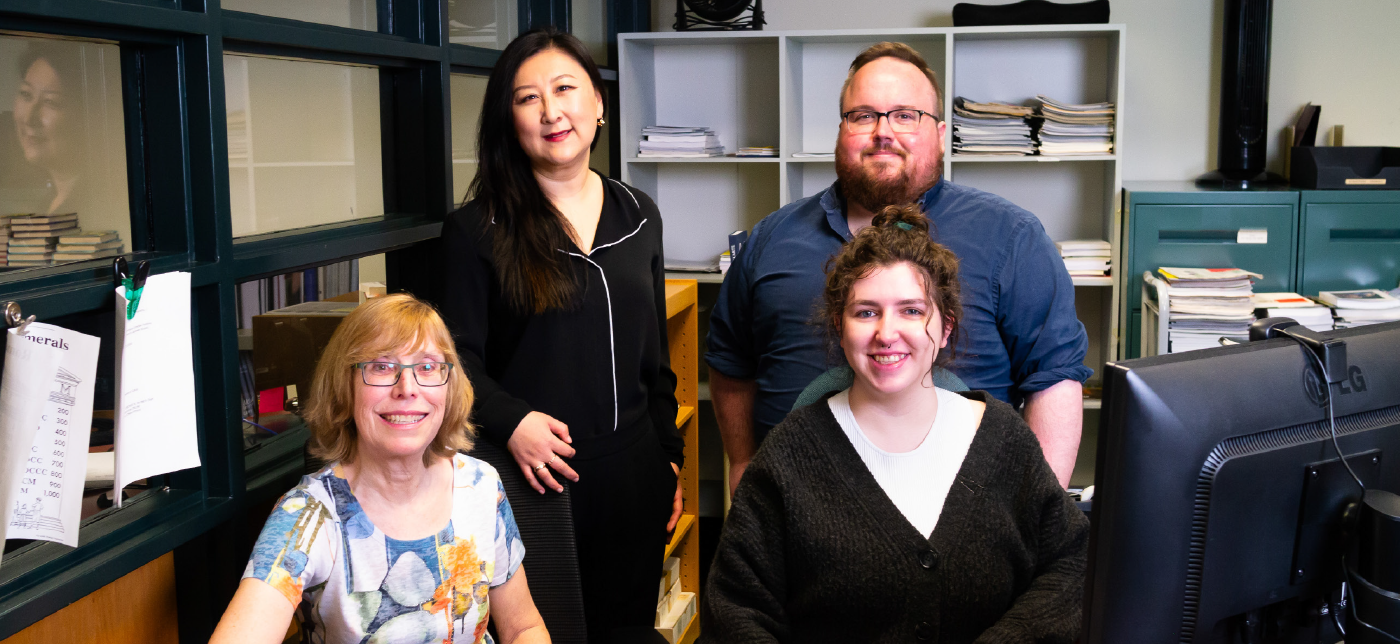
Librarians and staff in the Content, Access, and Open Licensing division are committed to diversifying the voices in McMaster University Library’s physical and digital collections.
Working together, they are expanding the narrative of what has traditionally been presented in academic scholarship.
“Past publishing has generally focused on the voices of white men—but this is only one perspective,” said Janice Adlington, head of collections and content strategy. “We want to showcase a range of voices in our collections here at McMaster University Library.”
Some of the voices librarians and staff have strived to amplify identify as 2SLGBTQI+, African and Caribbean, living with a disability, women and BIPOC in STEM, and Indigenous, among many others.
The team has collaborated closely with Crystal Mark, the library’s new diversity, equity, inclusion, and accessibility strategist since her arrival last fall. This has led to more materials, such as those built around special celebrations like Lunar New Year and Black History Month, and relationships built with bookstores, including those that are Black or Indigenous owned.
There has been an emphasis on ensuring new acquisitions encompass not only traditional print materials like books, but also electronic resources like e-books, primary source databases, and films.
Casey Hoeve, who joined McMaster University Library in fall 2022 as the new associate university librarian, Content, Access, and Open Licensing, and strategically leads the initiatives of the division, says he is proud of the work done to date and that is underway with diversity, equity, inclusion, and accessibility at the forefront.
“Libraries are considered places of record for those searching for truth,” Hoeve said. “It is essential we present a variety of perspectives and narratives, especially in this academic setting, to present a clearer picture of that truth.”
Read about complementary acquisitions in the William Ready Division of Archives and Research Collections later in this report.
Q & A with Crystal Mark
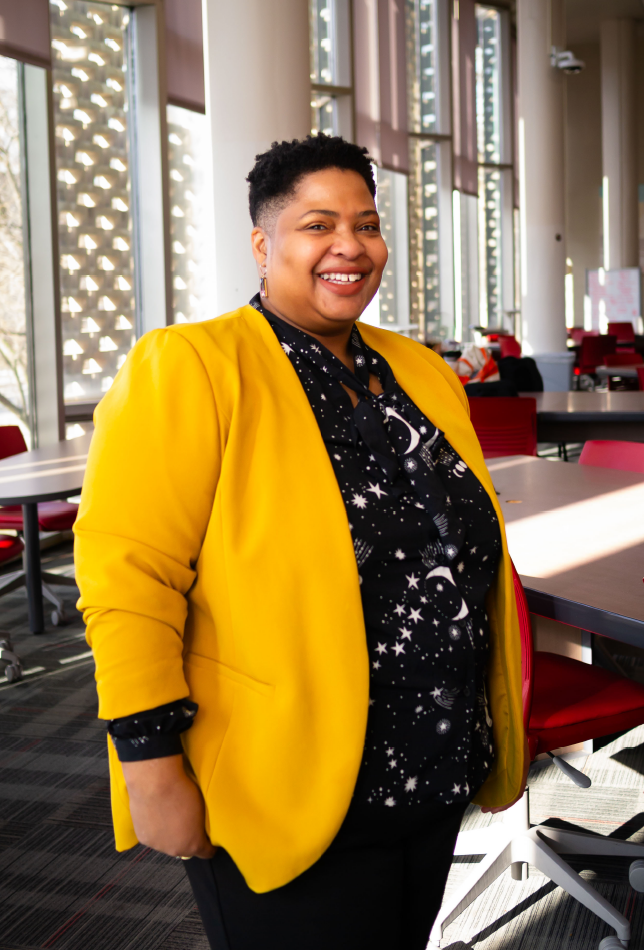
Crystal Mark is the new diversity, equity, inclusion, and accessibility strategist at McMaster University Libraries.
After spending more than 20 years in the field, she brings her expertise in equity, diversity, inclusion, and anti-oppression to McMaster University Library and the Health Sciences Library.
She says she was drawn to the role at McMaster University as it was a perfect fit for her as someone who loves reading, learning, poetry, and knowledge keeping.
Here, she shares her hopes for this role, how she is connecting with the McMaster community, and why her work matters.
What can you tell us about your new role?
My role is to embed diversity, equity, inclusion, and accessibility (DEIA) into the framework and infrastructure of the libraries. I am creating activities and processes that are going to allow us to bring greater inclusion into the workplace, have an anti-racist framework, and consider accessibility among our core tenants of how we run the libraries. I am creating guiding documents, such as a primer on pronouns for people to understand why pronouns are important, how to use them, and how not to use them. I am also creating an onboarding document with guiding principles and definitions so that we’re all on the same page in our language around DEIA. How we communicate is a big part of how we treat each other.
Why does your work matter?
This work matters because it’s at the crux of our sense of humanity. DEIA work includes all of us. If we do it right—sometimes we try and we fail and that’s okay—then we are working towards a world that is more inclusive. It means a better quality of life; that people feel confident about who they are as they come to work because they can share their whole selves. It’s important that everyone is invested in DEIA because it’s everyone’s conversation, everyone’s discussion, everyone’s dialogue, and everyone’s responsibility.
What are your measures of success?
One measure of success is if people feel more comfortable talking about race, accessibility, disability, and justice, and if people who have privilege champion these groups and these issues in our work culture. Another measure of success is collaboration with other departments on campus and more engagement with students. I also launched a DEIA LinkedIn Learning series for library staff, which would be an important milestone.
How are you engaging the McMaster community?
I like to go out and meet people. I organized an event to celebrate Black History Month and contributions to the literary canon from the diaspora. Readers from around the university, including Clare Warner, Renata Hall, and Juliet Daniel performed and read seminal works from the Afro-Caribbean-Canadian diaspora. In addition to that, I assisted in hosting Drag Story Time to raise awareness about Freedom to Read Week and the need to have all reading accessible to us in our communities. We are also creating a welcome sign in several different languages for the entrances of Mills Memorial Library. These actions will hopefully make people want to come into the library space and be happy to be here to talk about life, politics, justice, and more. I think it is excellent if we can create spaces to have those conversations.
Is there anything else you would like people to know?
I love to think of DEIA work as a baton. You’re given 30 to 40 years in your career, and you’re handed a baton. Your responsibility is to take up that leg of the race. While I take up my leg of the race, I want to build legacy and trust within organizations and people. I want to allow people to speak freely, to get it wrong, to move forward, and to try again. When I’m done with my work, I hand the baton off to the next generation. I know that I can’t solve the world’s problems in 40 years, but I can try, and we should all try. Working collaboratively as champions, great things can happen here at the libraries and at McMaster.
Meet our new colleagues
McMaster University Library welcomed more than a dozen full-time colleagues between May 2023 and April 2024. Here, four recent additions to the library team write about their work and why it matters to the McMaster community and beyond.

Crystal Mills (she/her)
Head, Access Services
Joined October 2023
As the head of Access Services for Mills, Thode, and (coming soon) Innis libraries, I oversee a team of library professionals who are the first point of access to our spaces, services, and resources. Our team keeps the libraries open, and we can reach 11,000 visitors a day! We help users at the service desks, provide research assistance, circulate books, ensure a safe and welcoming facility, manage our physical collections, supervise student employees, and deliver core library services such as interlibrary loans, eReserves, and outreach events.
In my role, I try to foster a culture of assessment and design thinking to reflect on, evaluate, and iteratively improve our internal procedures and services to ensure they are inclusive and user centred. In collaboration with my knowledgeable team and colleagues, we implement innovative services and technologies for the benefit of students, faculty, researchers, and community members. Whether your experience with the library is your favourite late-night study carrel in Thode, or obtaining a rare publication internationally via interlibrary loans, Access Services supports your academic and research needs.

Mark Pellegrino (he/him)
Digitization Services Librarian
Joined September 2023
As the digitization services librarian, I operate the Digitization Centre at Mills Memorial Library which supports McMaster departments and faculties by helping to preserve their content and make it accessible to researchers and students online. We work closely with archivists, librarians, and conservators from the division of archives and research collections to digitize rare books and archival collections and make them publicly available on our digital archives website. We also support Library Accessibility Services by digitizing books that are not available in a digital format and making them accessible to students who use assistive technologies like screen readers.
My personal research is based on digital curation, which involves the life cycle of digital content, from creation to online display, migration between systems, and long-term storage in digital archives. I also study and experiment with AI tools that turn digitized images of text from books into discoverable, searchable, and accessible documents using optical character recognition technology.
I’m thrilled to be here at McMaster and look forward to many years of preserving our past and supporting research and education.
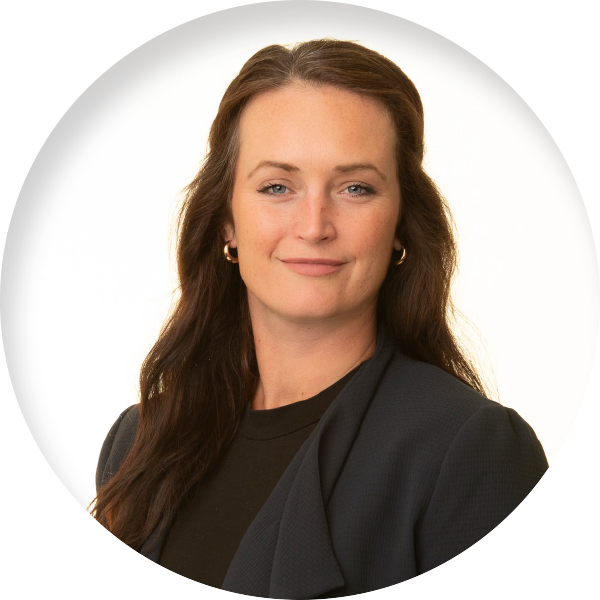
Carly Welch (she/her)
Manager, Finance and Administration
Joined July 2023
As the manager of finance and administration for the university library, my main objective is to safeguard the library’s financial health. Some specific areas of focus are budgeting, financial and strategic planning, data analysis, resource allocation, cost control and efficiency planning, and stakeholder engagement.
A large part of my role is analyzing data to ensure decisions are well-informed and support the library’s core functions and initiatives, with the goal to enhance the library’s ability to serve its patrons. It’s a pleasure to help support the library and all the amazing employees here.
While working at McMaster, I have enjoyed building strong working relationships. I will continue to put my energy into establishing strong connections within the university library community and leadership team.
My favourite part about working at the university library is the diversity of learning that is all around us and helping our patrons explore different areas of interest while furthering access to information for our community. It’s wonderful to be a part of this and I look forward to seeing all the successes to come.

Cameron Wheaton (he/him)
Collection Strategy Librarian, Social Sciences and Humanities
Joined January 2024
My role as the collection strategy librarian for social sciences and humanities is primarily focused on collaborating with my colleagues on the selection, acquisition, and management of resources related to the subjects and departments that I cover. There is a lot that goes into our decision making on how we curate and maintain our collections.
My work includes using data to assess collections and determine strengths and gaps that need to be addressed. I also engage with faculty members from my departments to inform them of new collections and tools the library has acquired, and to receive recommendations on what other resources the departments need. Our department is focused on continuously improving access to our collections by ensuring our resources meet accessibility standards, adopt open publishing models, and reflect the diverse, inclusive, and equitable values held by McMaster’s community.
The collection strategy work carried out by our department is crucial for building and maintaining relevant, useful collections that complement research and curricular activities at McMaster University.


Supporting Bertrand Russell Archives a family legacy
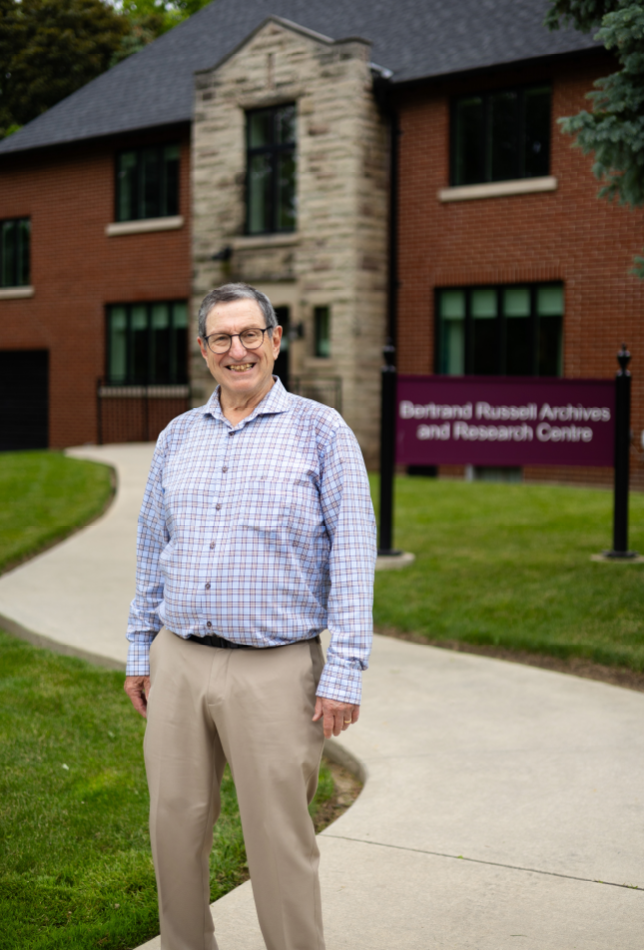
One of Bernard Linsky’s favourite places is the Bertrand Russell Archives at McMaster University Library.
As a respected philosopher and Russell scholar, it is logical that Linsky is a regular visitor and supporter.
What’s unique is that he lives more than 3,000 kilometres away in Edmonton and is a professor emeritus at the University of Alberta.
“People are sometimes surprised when I tell them I support McMaster University Library considering where I live and work,” he said with a chuckle. “I tell them that I want to support an institution, regardless of where it is located, that aligns with my passion.”
It could be said that Russell is in Linsky’s blood. His father, Leonard Linsky (1922-2012), was a renowned American philosopher and professor with a particular interest in Russell’s work.
“I remember uncovering manuscript material for the second edition of Principia Mathematica during one of my visits to the Bertrand Russell Archives when it was still located in the basement of the library,” he said. “I went back to my hotel and called up my father. He was one of the people who really understood the importance of what I had found.”
The McMaster discovery gave Linsky his next project and resulted in the publication of his 2011 book, The Evolution of Principia Mathematica: Bertrand Russell’s Manuscripts and Notes for the Second Edition.
Linsky says the people at both the Bertrand Russell Archives and the Research Centre, which share the same building, are as close to his heart as its papers and books. He is grateful for Ken Blackwell, Nick Griffin, and several other faculty and librarians affiliated with the archives.
“Archivists have a very good idea of what they have and what papers scholars should be looking at there,” said Linsky. “They have also sent me photocopies of materials between my yearly visits, which has been so helpful.”
When Linsky’s beloved father passed away, he knew he wanted to do something meaningful to honour his memory. As a result, he has generously donated to McMaster’s Bertrand Russell Archives in memory of his dad and mom, Leonard and Joan Linsky.
His gift in October 2018 allowed for the purchase of the first two volumes of Principia Mathematica proofs. The three-volume work published in 1910, 1912, and 1913 was written by Russell and Alfred North Whitehead. It is arguably Russell’s best known and most influential work.
Two years later, another significant donation by Linsky supported the purchase of G.H. Hardy’s copy of Principia Mathematica. Hardy was a renowned mathematician, a good friend of Russell’s at Trinity College, and reviewer of Principia Mathematica in The Times Literary Supplement. The copy features extensive notes in the margin.
There was a gift-in-kind soon after of a first edition of Russell’s 1912 book, The Problems of Philosophy.
Then, in May 2024, Linsky supported the purchase of an extraordinary collection of more than 2,000 pieces of correspondence between Russell and his first wife, Alys, and Russell and his publisher.
Vivian Lewis, associate vice-president and university librarian, says she is indebted to Linsky for his ongoing support.
“Bernie’s donations have enabled us to purchase several exciting additions to the Bertrand Russell Archives that we simply could not afford on our own,” said Lewis. “Supporters like Bernie are having a significant impact on Russell scholarship by making more documents and letters publicly available.”
Linsky says his father would have been tickled to learn he’s a supporter of the Bertrand Russell Archives.
“I think he would have liked it,” he said with a smile. “There’s even a room named after my parents at the archives, and that is a nice way to recognize them.”
Measuring the impact of McMaster University research
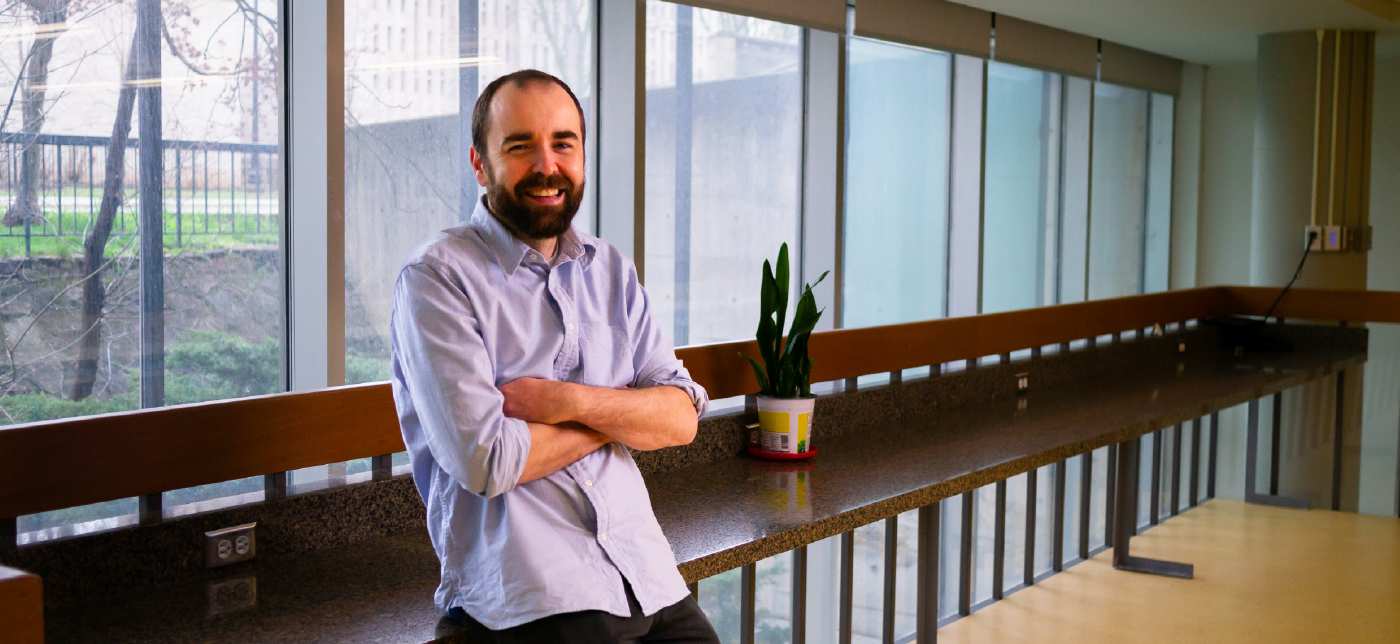
Jack Young admits he didn’t have research impact and bibliometrics librarian on his vision board when he graduated with a master of library and information science in 2014.
What he did plan for was meeting the needs of people coming to the library for support and being adaptive.
After nine years as a digital projects librarian at McMaster University’s Health Sciences Library, Young moved across campus in early 2024 to become McMaster library’s first full-time continuing research impact and bibliometrics librarian.
“This area was not something I was aware even existed when I started my career,” said Young. “As I continued in higher education and understood what was vital to keep the wheels turning when it came to research, it seemed that research impact and responsible research assessment were critically important.”
Bibliometrics use statistical approaches to better understand how research is produced, organized, and interrelated. It is one important tool among many to evaluate and illustrate areas of research strength, collaboration potential, and research impact.
During his time at the Health Sciences Library, Young gradually expanded his expertise and service offerings in the field, providing research impact assessments and bibliometric analyses for the research community.
Today, Young works with researchers and staff to develop comprehensive views of research output and impact at individual, group, and organizational scales. Often this information is required when applying for grants or awards.
He is also supporting the vice-president, Research, in understanding the impact of policies from the Canadian government around funding for certain types of research.
“The highlight of my role is working one-on-one with researchers and administrators,” said Young. “My favourite part of being a librarian has always been the people.”
Jay Brodeur, director of Digital Research Infrastructure and Scholarship Services, says it was the right time to add this permanent role to support McMaster’s research community.
“A global shift towards innovative and equitable research impact assessment is underway, and McMaster is on board,” Brodeur said. “We’re delighted to have Jack join the university library.”
By the numbers
McMaster University Library saw higher numbers closer to pre-pandemic times in its operations for the fiscal year of May 1, 2023 to April 30, 2024. Mills and Thode libraries were open and saw increased gate counts compared to the previous year. Innis Library, slated to open in 2025, remains closed as construction progresses on its new home in the McLean Centre for Collaborative Discovery. Library colleagues continued to support teaching, learning, and research at McMaster.
Collections
Titles held (all formats):
4,423,010
E-books*:
2,471,969
*Total held by McMaster University and Health Sciences libraries
Expenditures
Total acquisition expenditures:
$12,268,163
Instruction
Library presentations to groups:
286
Total participants in group presentations:
16,688
Reference
Number of reference questions answered:
25,954
Circulation
Number of items borrowed:
37,469
Interlibrary loans
Number of filled requests provided to other libraries:
9,171
Gate count
Mills Memorial Library:
816,964
H.G. Thode Library of Science and Engineering:
579,145
Innis Library:
Closed for construction
Digital experience
Main website pageviews:
1,721,912
Users:
393,211
Significant acquisitions: Archives
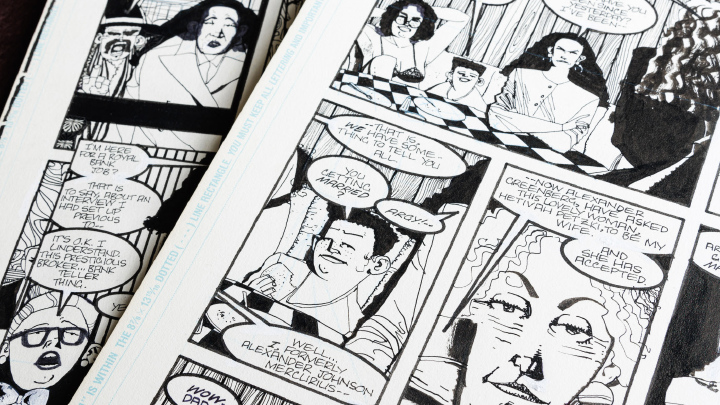
Ho Che Anderson Collection
Ho Che Anderson is a renowned Toronto-based cartoonist who was inducted into the Canadian Comic Book Hall of Fame in 2021. He has created numerous graphic novels, including King: A Comics Biography of the Reverend Doctor Martin Luther King, Jr.; Godhead, a science fiction action-adventure; and Sand & Fury, a horror thriller. Active since the 1990s, Anderson has published with Fantagraphics, DC, Dark Horse, and Marvel, among others.
Ho Che Anderson’s donated collection consists of scripts and original artwork for his early publication, I Want to Be Your Dog, an erotic comic published in 1996 under Fantagraphics’ erotic comics imprint, Eros Comix. The collection also includes artwork for the 2013 publication Miles from Home, the sequel to I Want to Be Your Dog.
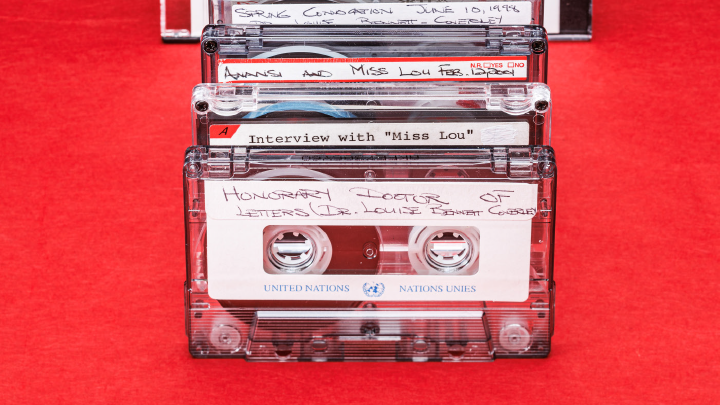
Neil Armstrong Archive
Neil Armstrong is a journalist who has worked in radio, newspaper, and television. He was host of the literary show “Covered and Bound” at CHRY Radio (105.5 FM, York University) from 1995 to 2004. In his capacity as host and bibliophile, he met and interviewed hundreds of Canadian and international authors — many from Black, Caribbean, and African communities.
Neil Armstrong’s fonds comprises audio recordings of interviews he conducted with prominent Black and Caribbean artists, authors, poets, and politicians for CHRY 105.5 FM. Interviews cover topics such as Black and Caribbean histories, literature, community events, and more. Interviewees include the Honourable Lincoln Alexander, Dionne Brand, Afua Cooper, the Honourable Rosemary Brown, Austin Clark, Louise Bennett-Coverley (Miss Lou), and others.
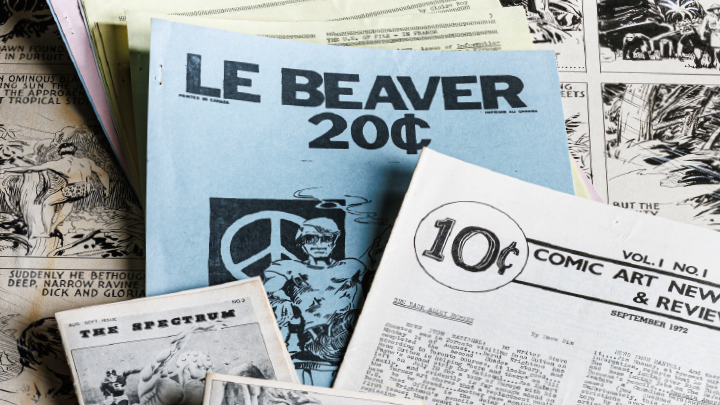
Art Cooper Collection of Comic Art and Fanzines
Art Cooper is a McMaster alumnus, comic artist, and collector who created original artwork for McMaster campus posters and Hamilton comic fandom publications in the 1960s and 1970s. His donated collection contains original artwork for the McMaster Campus Cinema screening program; fanzines and mini comics from the Southern Ontario region; and an original full page from the Tarzan newspaper comic strip, drawn by Hal Foster in March 1936.
Hal Foster (1892-1982) was a Canadian-born artist whose work was foundational to the adventure comics genre. He is best known for Tarzan, an adaptation of Edgar Rice Burroughs’ novel series, and Prince Valiant, launched in the 1930s. The Tarzan comic in this collection was acknowledged as being of “outstanding cultural significance” by the Canadian Cultural Property Export Review Board in December 2023.
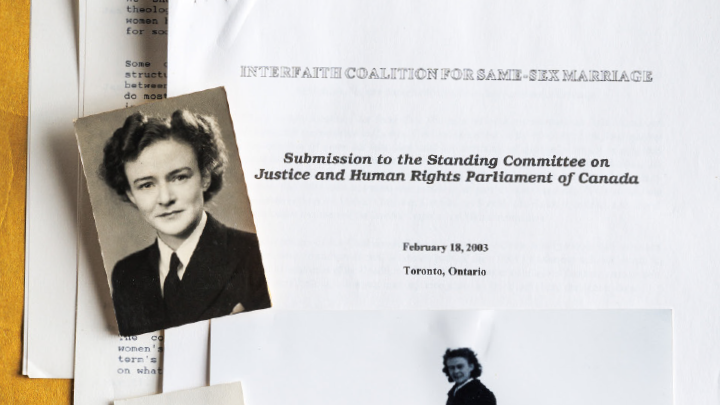
Jo Vellacott Archive
Patience Josephine Ruth (Jo) Vellacott was a British-Canadian historian, professor, feminist, Quaker, and peace activist. Born in Plymouth, England in 1922, she studied at the University of Oxford, University of Toronto, and McMaster University, from which she received a PhD in history in 1975. Vellacott’s scholarship focused on the intersections of the suffragette movement and peace activism, Edwardian feminist and pacifist Catherine Marshall, and Bertrand Russell’s pacifism, among other topics. She taught at Queen’s University in Kingston and Concordia University in Montréal.
Jo Vellacott’s archive is a rich trove of information about her life and work. Records include her correspondence, documentation regarding her scholarly publications and Quakerism, personal photographs, paintings, and sketches.
Significant acquisitions: Rare books
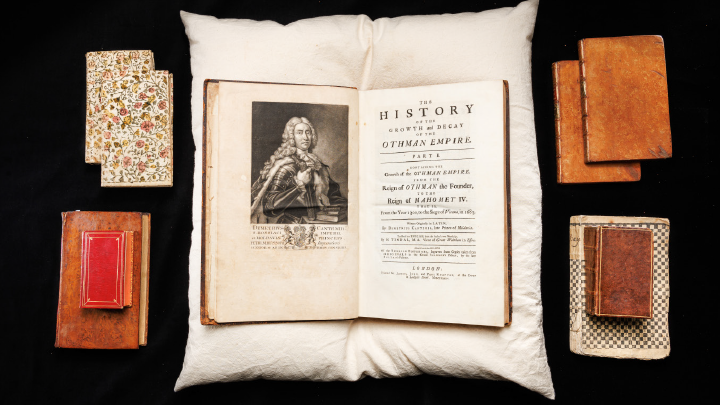
John Fleming Library
John Fleming (McMaster class of 1958) spent a lifetime collecting rare books, with a particular focus on 18th-century French controversialism and the works of Restif de la Bretonne—a contemporary (and sworn literary enemy) of the Marquis de Sade. This extraordinary library, donated to McMaster in 2023, comprises over 700 volumes spanning five centuries of publishing, including many titles not otherwise found in any North American library.
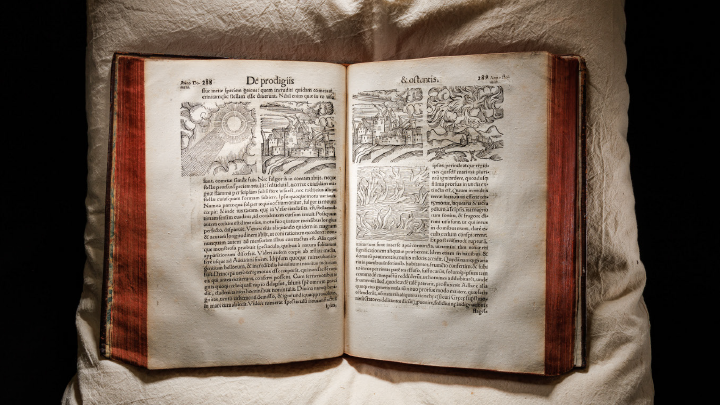
Prodigiorum ac ostentorum chronicon…
Lycosthenes, Conrad Wolffhard
(Basel, 1557)
Extensively illustrated first edition of a remarkable “book of wonders” chronicling celestial phenomena, natural disasters, “miraculous” occurrences, and inexplicable events in general. Written during a time of dizzying change, burgeoning discovery, and lingering superstition, the book includes an uncannily UFO-like illustration of a “comet” which appeared over the Arabian peninsula in 1479.
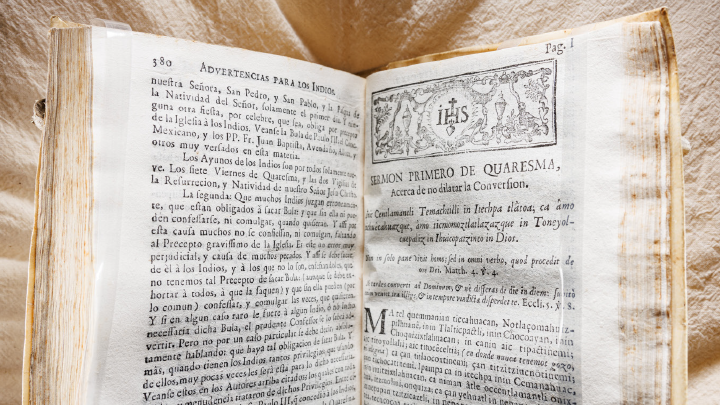
Promptuario Manual Mexicano…
Ignacio de Paredes, S.J.
(México, 1759)
This works sits at the confluence of Indigeneity, organised religion, printing, and identity in 18th-century Mexico. Written almost entirely in Nahuatl by the Jesuit Ignacio de Paredes—an accomplished linguist who was himself a Creole—the book chiefly consists of sermons and readings for the use of priests ministering to Indigenous communities.
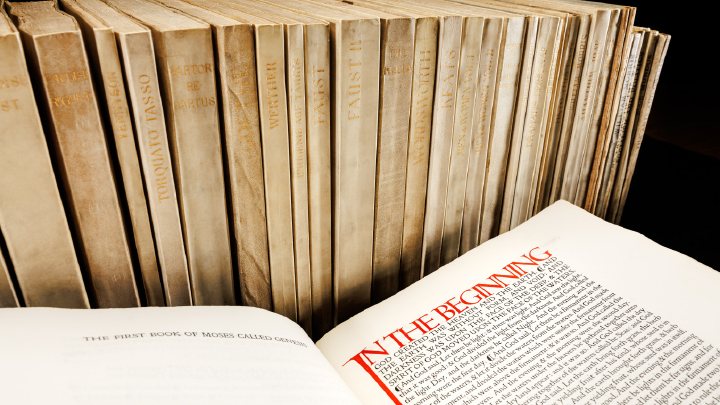
Doves Press / Hammersmith Publishing Society
T.J. Cobden-Sanderson, Emery Walker, Anne Cobden-Sanderson, et al.
(London, 1900-1916)
In 2024, McMaster acquired a complete run of all vellum-bound editions produced by the Doves Press—the high point of Arts and Crafts typographic excellence—as well as the associated output of the Hammersmith Publishing Society. McMaster now holds one of the most complete Doves collections in the Americas.
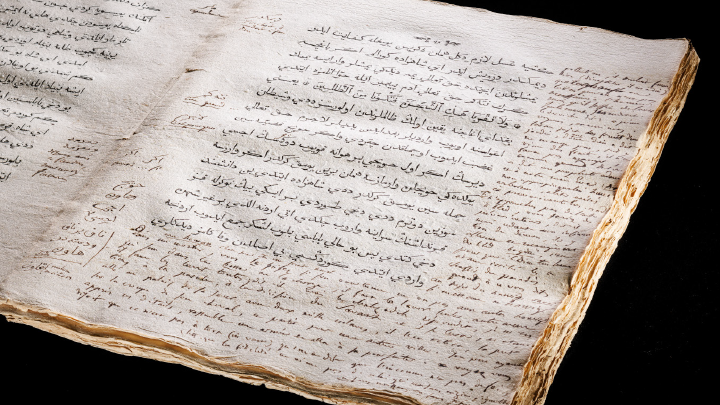
Contes turcs en langue Turque : extraits du roman intitulé Les quarante vizirs
“Ahmed-i-Misri” (apocryphal); B. Belleteste (editor)
(Paris, 1812)
A set including two copies of a rare work typeset and printed in Ottoman Turkish by the French imprimerie impériale. One copy is unmarked; the other includes a contemporary handwritten translation of the text into French by a previous reader. The work itself is an important collection of tales in the tradition of Turkish vernacular literature.

Le Nouveau Testament…
(Amsterdam, 1677)
An annotated example, in an exquisite gold-tooled binding, of an early modern book printed by a woman-owned press. Susanna Veselaer, the printer, was an astute businesswoman who specialised in the commercial export of bibles from the Netherlands to England—an extremely lucrative enterprise. This copy possesses a lavish binding by a highly-skilled contemporary English bookbinder.
2023-24 Library Leadership Group
Vivian Lewis
Associate Vice-President and University Librarian
Casey Hoeve
Associate University Librarian
Content, Access and Open Licensing
Helen Kula
Associate University Librarian
Teaching and Learning
Lynne Serviss
Associate University Librarian
User Services and Community Engagement
Wade Wyckoff
Associate University Librarian
Distinctive, Legacy, and Digital Heritage Collections
Jason Brodeur
Director, Digital Research Infrastructure and Scholarship Services
Anne Pottier
Director, Technology Support and Operations
Joey Ricottone
Associate Director, Campus Classroom Technologies and Library Computing
Chris Nicol
Manager, Human Resources
Carly Welch
Manager, Finance and Administration

